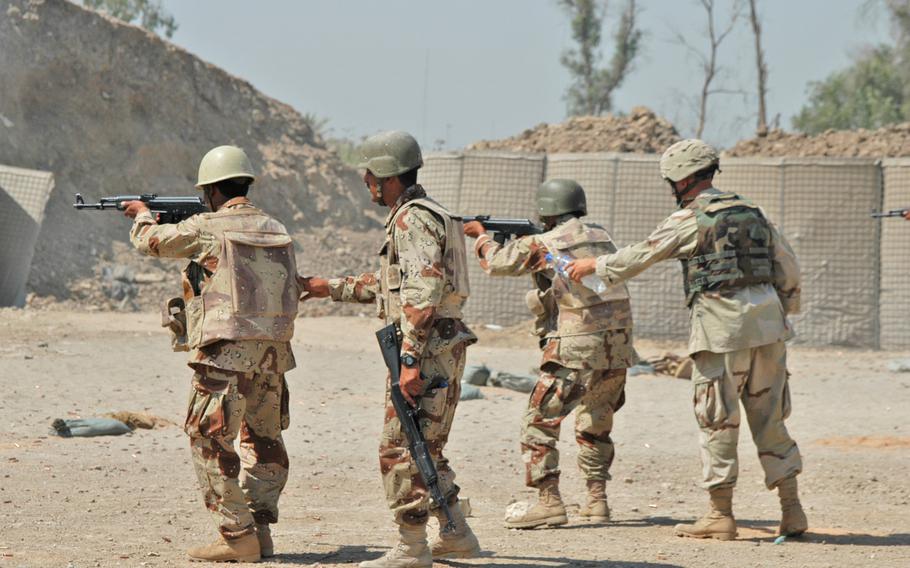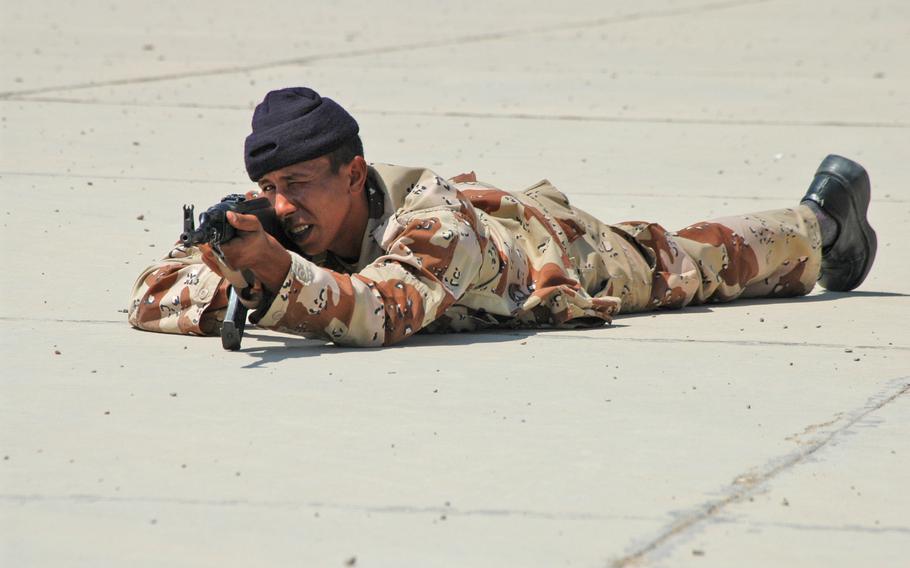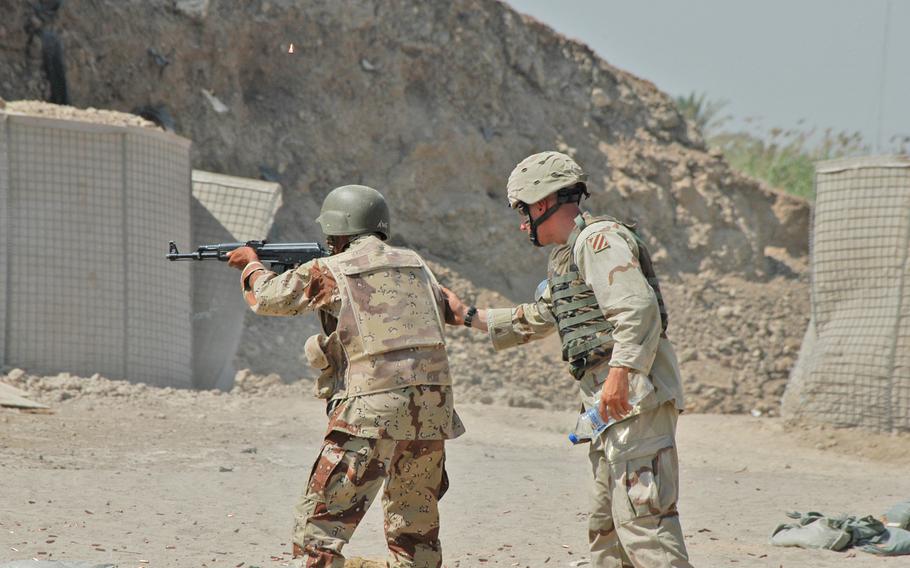
An Iraqi, left, and a U.S. officer help two Iraqi soldiers with their marksmanship. The drill teaches soldiers how to hit their targets while moving. The U.S. Army often looks to Iraqi officers and even platoon leaders to help teach the soldiers, who often have only a primary education and no formal military experience. (Teri Weaver/Stars and Stripes)
This article first appeared in the Stars and Stripes Mideast edition, June 5, 2005. It is republished unedited in its original form.
CAMP INDEPENDENCE, Iraq — Lt. Michael Ranado had reservations when he found out he was going to be training Iraqi men to become soldiers.
Ranado, a member of the 6th Battalion of the 8th Cavalry, had arrived in Iraq in February, and he’d spent the first few months patrolling Iraqi streets as so many other soldiers do here.
Despite the mix of dangerous attacks and nerve-wracking boredom while on patrol, Ranado was reluctant to change.
“That’s what we had been doing,” the 25-year-old from Corinth, N.Y., said of his platoon. “That’s what we like doing. We had a battle rhythm going.”
After nearly six weeks of working with the Iraqis, he’s changed his mind, he said Wednesday.
“This is a more important mission right now,” he said, watching Iraqi officers drill Iraqi soldiers in a field movement exercise at Baghdad’s Camp Independence.

An Iraqi soldier simulates giving cover while another group of soldiers advances during a drill at Camp Independence. The U.S. soldiers use the camp to train Iraqi soldiers, who live there during weekdays but go home on the weekends. Most of the Iraqis use cabs or buses to get home, usually a two to three hour ride, the U.S. soldiers said. (Teri Weaver/Stars and Stripes)
Many American officers and soldiers here are faced with the same task as Ranado: building a self-sufficient Iraqi army. The U.S. military is working with Iraqi officers with experience to teach, company by company, the basics of soldiering and warfare.
While the Iraqis are learning to be soldiers, the U.S. soldiers are learning to be better teachers.
They’ve learned it works best to teach an Iraqi officer or platoon leader the techniques, then let him pass the information onto his soldiers.
They’ve learned that the Iraqis who served in the military before the war know many outdated, Cold War tactics, which must be replaced.
They’ve also learned what it’s like to talk to erstwhile enemies after the shooting stops.
“It’s fun to talk tactics with someone from the [former] enemy,” Ranado said. “It’s not something you often get to do.”
The Americans also understand that some of the lessons are as much cultural as they are militaristic.

A U.S. soldier works with an Iraqi soldier on marksmanship at Camp Indepedence, Iraq. The Iraqi soldiers have spent more than a month at Independence, learning the basics of being a soldier. In a few weeks, they will go out on their first patrol. (Teri Weaver/Stars and Stripes)
The Iraqi soldiers were slow to accept the concept of “noncommissioned officers,” the term the U.S. military applies to sergeants who help officers command. In the U.S. Army, an NCO might take the lead in a part of a mission, be privy to the mission’s priorities and even assume command if higher-ranking officers on the field are killed, Ranado said.
Taking orders from a fellow soldier takes some getting used to, Ranado said. In the former Iraqi military, only the officers were trusted to give directions, he said.
The learning curve for the Iraqis is steep, Americans said.
“They’re being asked to learn a lot fast,” said Lt. Karl Hoempler, 28, of Richmond Hill, Ga., who’s assigned to Headquarters and Headquarters Company of the 464th Armor Battalion. “It’s like they’re drinking through a fire hose.”
On Wednesday, Hoempler watched as Iraqi soldiers practiced their marksmanship while moving. The soldiers had been training for a little more than a month, and that week they had begun going out on patrols in Baghdad, he said.
Capt. Lee McKnight, 31, of Sumter, S.C., is in charge of training Iraqi Company A within the same battalion. He said the Iraqi soldiers are getting more time on the shooting range than the average U.S. soldier in training.
Later Wednesday, McKnight took a platoon of his Iraqi soldiers out on a patrol. “I shadow them,” he said. “I only intervene if there’s a safety issue.”
Unlike Ranado, McKnight and Hoempler will likely spend their entire year in Iraq training soldiers.
“I’m excited about it,” McKnight said. “They want to do it. They’re eager. It’s their homeland.”
McKnight, like many other American servicemembers, is excited for another reason. “I believe it’s the only way to get U.S. soldiers out of here,” he said.
Looking for Stars and Stripes’ coverage of the Iraq War? Subscribe to Stars and Stripes’ historic newspaper archive! We have digitized our 1948-1999 European and Pacific editions, as well as several of our WWII editions and made them available online through https://starsandstripes.newspaperarchive.com/